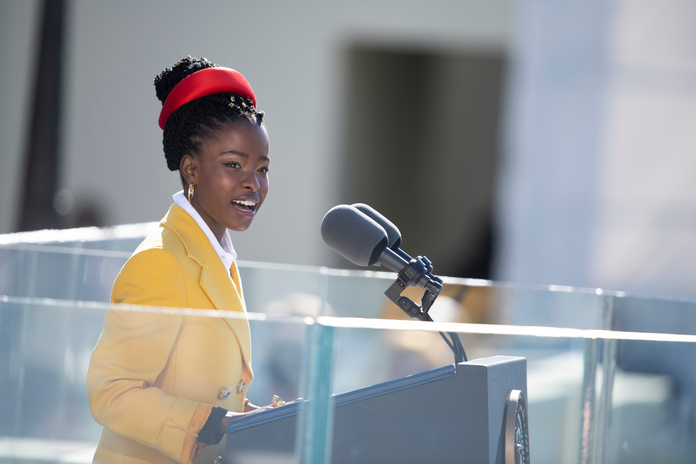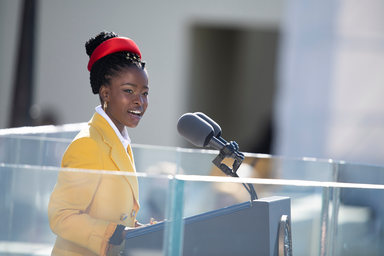Gratitude for America at last: the hope of vital transformation permeated the hemisphere as billions of Americans watched the inauguration of the forty-sixth President, Joe Biden. On January 20, 2021, Biden related the signing of the Emancipation Proclamation by Abraham Lincoln to the soul-shattering work he hopes to embark on to change the world – similar to Percy Bysshe Shelley’s ideas in The Defense of Poetry. In his inauguration speech, Biden preached, “When [Lincoln] put pen to paper, the president said, and I quote, ‘If my name ever goes down into history, it’ll be for this act, and my whole soul is in it.'”
Just as unaware as Lincoln was to the effect of his signature, many great poets and their readers are unable to appreciate the extent of their words until decades later. In The Defense of Poetry, Shelley explains how poetry’s excellence is “reserved for future generations to contemplate and measure the mighty cause and effect in all the strength and splendor of their union.” She also states, “poets are the unacknowledged legislators of the world” (Shelley), for they express eternal truths and beautiful notions of the world that civilization is founded on; necessary for past and future generations to flourish on.
If only Shelley could have met Amanda Gorman.
As the youngest inaugural poet in U.S. history, twenty-two-year-old Amanda Gorman spoke powerfully of racial injustice in America – not only by dazzling the audience with her vibrant yellow peacoat and caged bird ring as a tribute to Maya Angelou but with her optimistic words of holding onto hope. Gorman began her poem, ‘The Hill We Climb’ by asking the audience, “When day comes, we ask ourselves, where can we find light in this never-ending shade?” My body erupted in full chills as I watched this woman, only one year older than myself, speak of a world coming together, despite the seemingly dark blanket that was spread over the world at the moment, ridden with Pandemic, terror, and disputes. She explains that the nation is not broken, just “unfinished” – advice we must all learn to apply to ourselves: bettering our beings and working on channeling positive inner dialogue.
As Gorman asks us to run towards the light later on in her poem, she relates her own experiences. She says, “we, the successors of a country and a time where a skinny Black girl descended from slaves and raised by a single mother can dream of becoming president, only to find herself reciting for one” (Gorman). It was Dr. Jill Biden, the new First Lady of the United States, who selected Gorman for the performance. Gorman speaks her truth for the whole world to hear, to aspire on, to cherish.
Many of us may feel that our country is broken, but Gorman proves that notion wrong. The history of previous wrongdoings allows for a greater today and a superior tomorrow. The poets who write with earnestness teach us morals from thousands of years ago and allow us the grace to live more fulfilled than they ever could. They exercise their minds to places many of us are unwilling to go, for many of us would rather stay confined to the knowing than leap into the realm of who-knows-what. It is why we choose to tie ourselves to a singular political party; we are either this or that – fearing that the moment we come undone, our world will crash with such a thump that even the skiers down in Utah will sense a shifting in the mountain.
As Shelley elegantly writes, “we want the creative faculty to imagine that which we know; we want the generous impulse to act that which we imagine; we want the poetry of life; our calculations have outrun conception; we have eaten more than we can digest” (Shelley, The Defense of Poetry). Shelley knows the secret of poets; they crawl across the borders and swim away the clowns waiting to pounce in the closet – they understand that a calculated life is not a life at all. Gorman knows this too when she says, “we will not march back to what was, but move to what shall be: a country that is bruised but whole, benevolent but bold, fierce and free” (Gorman). Words that are spoken directly from the heart, conjured from the crevices of where imagination ceases to think of anything less than unicorn spirits is what Shelley defines as poetry – divine, linguistic, and an uncanny match to the poet’s soul.
Gorman’s final lines of her poem make a lasting impression of her greatness as she says, “there is always light, if only we’re brave enough to see it. If only we’re brave enough to be it.” The power of communication through stunning sentences has the capability to deny the evils and ratify the exquisiteness of mother nature – even for a split second in time. Thank goodness for Amanda Gorman.



